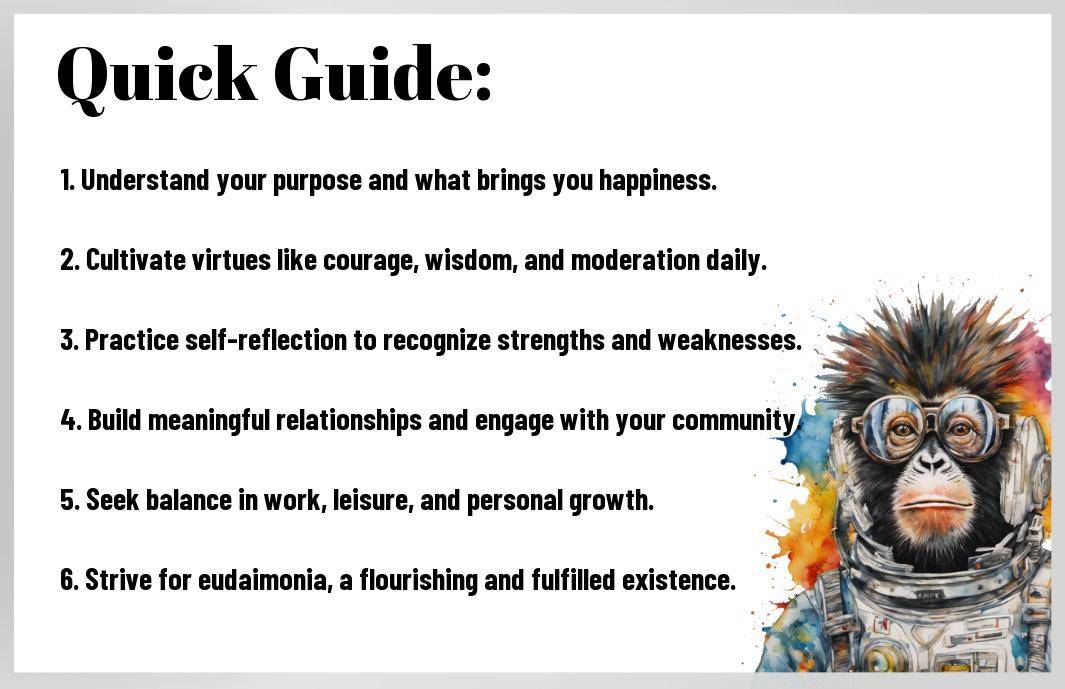
Newsletter Subscribe
Enter your email address below and subscribe to our newsletter

Enter your email address below and subscribe to our newsletter

Just like you, I’ve often pondered what it truly means to live a good life. Aristotle, the great philosopher, offers timeless wisdom that can help us find our path to happiness and fulfillment. In this guide, I’ll share insights from his teachings on virtues, purpose, and the pursuit of happiness that can inspire you to cultivate a meaningful life. Join me as we explore how to apply Aristotle’s philosophies to our everyday experiences!

A deep investigate Aristotle’s philosophy reveals rich insights into what constitutes a good life. His ideas revolve around practical wisdom and the pursuit of happiness. Unlike many modern interpretations that link happiness to fleeting pleasures, Aristotle introduces us to the notion of eudaimonia, a broader and more fulfilling sense of well-being. To Aristotle, living a good life isn’t simply about seeking pleasure; it’s about realizing your highest potential and flourishing as a human being. I find this perspective incredibly empowering because it encourages me to pursue growth and a meaningful existence in my daily life.
Philosophy has long contemplated our purpose and how we attain true happiness. For Aristotle, the term eudaimonia encapsulates this idea perfectly. It translates roughly to “good spirit” or “flourishing,” suggesting that a good life is about more than just transient joy; it’s about nurturing my soul and cultivating virtues like bravery, wisdom, and generosity. Essentially, eudaimonia is achieved when I live in accordance with my true nature and fulfill my potential. I find that by aligning my actions with my values, I endow my life with greater meaning and satisfaction.
Golden rules might sound cliché, but Aristotle’s concept of the Golden Mean brings that idea to life in a compelling way. This principle suggests that virtue lies in moderation, guiding me to find a balanced approach in various aspects of my life. For instance, rather than indulging in excess or falling into deprivation, the Golden Mean encourages me to seek a middle ground. Whether in my relationships, work, or personal development, I strive to embody this balance. It’s a reminder that neither extreme is beneficial when searching for genuine fulfillment.
Aristotle’s idea of the Golden Mean outlines how finding balance is important for developing virtues. I’ve learned that moderation is not merely a passive state but an active pursuit that involves evaluating my behaviors and emotions regularly. For example, practicing courage without veering into recklessness embodies this principle perfectly. Life’s various dimensions require me to consistently reassess where I stand in terms of balance, pushing me toward a more harmonious and gratifying existence. By embracing this approach, I feel empowered to navigate the complexities of life while staying true to my path of virtuous living.

The exploration of virtues according to Aristotle leads us to understand two significant categories: moral virtues and intellectual virtues. Each type plays an important role in living a fulfilling and good life. Below, I’ve outlined various virtues within these categories that you might find relatable:
| Moral Virtues | Intellectual Virtues |
|---|---|
| Courage | Wisdom |
| Temperance | Understanding |
| Generosity | Knowledge |
| Justice | Prudence |
| Friendliness | Philosophical Wisdom |
An important aspect of Aristotle’s philosophy is the emphasis on moral virtues. These virtues are qualities that guide our actions and decisions, helping us to build stronger relationships and foster a sense of community. They are developed through practice and are about finding the right balance in our behavior. As we start living with moral virtues, we cultivate habits that benefit both ourselves and those around us. The journey is about consistent practice and striving for that golden mean between deficiency and excess.
Moral virtues, while important for our interactions and character, lead us to intellectual virtues, which are equally significant in the pursuit of a good life. These virtues concern the mind and enable us to reason, learn, and grow. They guide us in understanding complex issues and developing our judgment. By nurturing intellectual virtues, you equip yourself with the ability to think critically and make informed decisions that align with your values and aspirations.
Virtues help deepen our understanding of the world around us and enhance our ability to navigate life’s complexities. Engaging with intellectual virtues encourages curiosity and promotes a lifelong love of learning. When we commit to developing these attributes, we not only enrich our perspectives but also become better equipped to contribute positively to the lives of others. Recognizing that both moral and intellectual virtues work together can lead you to a harmonious and meaningful existence.

Once again, I find it important to highlight the core of Aristotle’s philosophy: virtue lies in the balance between excess and deficiency. By following a structured approach, we can cultivate virtues that lead us to a fulfilled life. Here’s a simple guide that I believe will help you develop a virtuous character:
| Steps | Description |
|---|---|
| Self-Reflection and Awareness | Take time to reflect on your values and recognize your strengths and weaknesses. |
| Practicing Virtue in Daily Life | Implement virtues in your routine and social interactions. |
Now, I want to emphasize the importance of self-reflection and awareness in the journey of cultivating virtue. Taking time to pause and truly evaluate my values helps me understand who I am and what I stand for. This self-assessment allows me to identify the areas in my life where I excel and others where I might fall short. It’s through this honest examination that I can develop a clear picture of the virtues I want to cultivate.
In my daily life, I’ve found that journaling or meditating on my thoughts can really enhance my self-awareness. This practice encourages me to confront my actions and choices more openly, fostering a deeper understanding of my motivations. By setting aside time for this reflection, I’m able to align my behavior with my values more effectively, paving the way for genuine growth in my character.
Cultivating virtues is not just an abstract idea—it’s about putting those ideals into action in my daily life. I strive to embody virtues like kindness and honesty in all my interactions, whether I’m with family, friends, or even strangers. This could mean lending a helping hand when I see someone in need or actively choosing to communicate truthfully, even when it’s uncomfortable.
A great way to start implementing virtue is by setting small, achievable goals each day. For instance, I aim to perform one act of kindness daily, whether it’s complimenting someone or assisting a colleague with a task. Over time, I notice that these small changes not only benefit others but also enrich my sense of purpose and fulfillment. By consistently practicing these virtues, I gradually embed them into my character, leading to a more harmonious and meaningful life.
Many elements contribute to living a good life, and I have found that certain key factors stand out. Understanding these factors can significantly enhance my overall happiness and fulfillment. Here are some of the vital components to consider:
After identifying these factors, I find it helpful to reflect on how each one can play a role in my daily life.
The connections I build with others have a profound impact on my well-being. When I nurture strong relationships with family, friends, and colleagues, I find that my happiness increases significantly. These connections provide me with support, companionship, and a sense of belonging. Additionally, being part of a community allows me to share experiences and engage in collective activities that enrich my life.
Moreover, I have realized that giving back to my community fosters a deeper sense of purpose and fulfillment. By volunteering or simply engaging with my neighbors, I not only contribute to the well-being of others but also reinforce my own sense of connection and belonging.
If I want to live a good life, I need to pay attention to my habits, as they shape my daily experiences and long-term outcomes. Developing positive habits can lead to greater satisfaction and a sense of achievement. I often find that small, intentional changes in my routine can have a significant impact on my overall quality of life. Whether it’s exercising regularly, practicing gratitude, or setting aside time for personal reflection, these habits cultivate an environment for growth and well-being.
Habits can be powerful tools for personal transformation. By focusing on the routines that serve me well and gradually replacing the ones that don’t, I can create a solid foundation for a life filled with purpose and joy. It’s all about the consistent choices I make each day—no matter how small—that lead me closer to my vision of a good life.
Now that we’ve explored the essence of Aristotle’s philosophy, let’s look at some practical tips for applying his teachings to our daily lives. Embracing the concept of virtue, I’ve learned that it’s not just about knowing what is good, but actively incorporating it into my life. To help you get started, here are some easy tips to start integrating these ideas:
Perceiving the world through the lens of Aristotle’s teachings can profoundly enhance our experiences and relationships.
Some simple daily practices can significantly enhance your journey towards living a good life. I’ve found that starting my day with a moment of gratitude helps to set a positive tone. It can be as simple as acknowledging the things I appreciate in my life or the potential of the day ahead. You might also consider journaling your thoughts or emotions, which allows for reflection and growth over time. Incorporating physical activity also resonates with Aristotle’s idea of balance; it invigorates not just the body, but also the mind.
Personal goals are crucial for aligning my actions with my values, while also fostering a sense of purpose. When I set specific, measurable goals, it gives me direction and clarity in my life. It’s important to establish goals that reflect your ideal state of well-being and happiness. Whether it’s enhancing my skills in a hobby, improving my health, or nurturing relationships, I’ve found that focusing on my goals cultivates a deeper connection to the pursuit of virtue in my daily life.
With the right mindset, you can break your long-term aspirations into manageable steps. By checking in on these goals regularly, you can ensure they remain aligned with your evolving values. This ongoing evaluation helps me stay focused and motivated, ultimately guiding me closer to that state of eudaimonia—living a flourishing life. Perceiving this process as a lifelong journey will aid you in cultivating sustainable habits and a sense of fulfillment.
All in all, Aristotle’s philosophy provides a structured outline for achieving a fulfilling life. However, like any approach, it has its upsides and downsides. To give you a clearer understanding, I’ve compiled a table that highlights some of the pros and cons of Aristotle’s approach to living a good life.
| Pros | Cons |
|---|---|
| Encourages personal growth through virtue | Can be subjective in defining virtues |
| Promotes a balanced lifestyle | May not account for external factors affecting happiness |
| Emphasizes the importance of community | Requires a deep understanding of oneself |
| Offers a framework for ethical decision-making | Potentially overlooks cultural differences in values |
| Encourages pursuit of excellence | Can be time-consuming to practice consistently |
| Stresses the significance of moderation | May lead to paralysis by analysis when making choices |
| Inspires a deeper understanding of purpose | Can seem overly idealistic to some |
| Focuses on emotional and intellectual well-being | May feel impractical for modern lifestyles |
Approach to living virtuously as espoused by Aristotle can manifest in numerous positive ways in your daily life. Practicing virtues like honesty, courage, and generosity can improve your relationships and increase your sense of fulfillment. As I work towards embodying these attributes, I often notice that people are drawn to my authenticity, and I find myself experiencing greater emotional stability. Additionally, when you prioritize virtue, you foster a deeper appreciation for life’s simple pleasures and the people around you, which can make every day more rewarding.
Moreover, embracing a virtuous lifestyle often leads to a harmonious balance between your ambitions and the well-being of others. By focusing on the common good rather than self-interest, you cultivate a sense of community that enriches your life as well as the lives of those you interact with. I’ve also found that striving for personal excellence fosters a mindset of lifelong learning and growth. This continuous journey of self-improvement not only enhances my capabilities but also brings a sense of purpose to my life.
Approach to Aristotle’s ideas isn’t without its challenges. One major criticism is that his definition of virtue may vary widely from person to person. What I view as virtuous might not resonate with someone else based on their culture or beliefs. Additionally, the emphasis on rationality may sideline the emotional complexities that many of us experience. In our fast-paced world, where external pressures can influence our happiness, practicing virtue as a singular pathway to a fulfilled life might feel rigid or unrealistic, placing unnecessary burden on individuals trying to align with these ideals.
With this in mind, it’s also worth considering that Aristotle’s framework does not take into account the numerous factors shaping our personal experiences. Life is often unpredictable, and circumstances can challenge our ability or desire to act virtuously. Economic strain, societal pressures, or personal struggles can all complicate the pursuit of a good life as defined by Aristotle. While the pursuit of virtue is admirable, I feel it’s vital to recognize that everyone has their own path to happiness, and adapting those ancient teachings to fit modern life is key to genuinely living out their wisdom.
Ultimately, exploring Aristotle’s insights on living a good life can be a transformative journey for you and me. His emphasis on virtue, moderation, and the pursuit of knowledge reminds us that happiness is not just a fleeting emotion but a state of being cultivated through our choices and actions. I encourage you to reflect on these teachings and consider how they might apply to your life. If you’re curious and would like to research deeper, check out How to be happy: Aristotle’s 11 guidelines for a good life for a thoughtful exploration of these ideas.
By adopting a more balanced approach to our daily lives and focusing on developing our character, we can foster deeper connections and a sense of fulfillment. Let’s enjoy the process of growth together, pursuing wisdom and virtue as we journey towards a more meaningful existence. After all, I’m convinced that with a little attention to Aristotle’s teachings, we can create a life that feels genuinely good and purposeful.
A: Aristotle’s Guide to Living a Good Life emphasizes the importance of virtue, reason, and the pursuit of eudaimonia, often translated as ‘flourishing’ or ‘the good life’. He argues that living in accordance with virtue is imperative to achieving happiness and fulfillment, and that ethical behavior is intertwined with rational thought and social interaction.
A: Aristotle defines virtue as a character trait that lies between deficiency and excess, known as the ‘Doctrine of the Mean’. He believes that virtues are habits developed through practice and that they enable individuals to act according to reason. For Aristotle, virtues help cultivate a balanced and ethical life, leading to eudaimonia.
A: Reason is central to Aristotle’s philosophy of living a good life. He asserts that humans are unique in their ability to reason, which allows them to make moral choices and pursue virtues. By exercising reason and rationality, individuals can align their actions with their values, fostering personal growth and ethical living.
A: Eudaimonia, in Aristotle’s thinking, refers to a deeper sense of fulfillment and thriving that encompasses living well and achieving one’s potential. Unlike modern interpretations of happiness that often equate it with fleeting pleasure or satisfaction, eudaimonia is about long-term flourishing and cultivating virtues that sustain a meaningful life.
A: Practical steps include identifying and practicing virtues that resonate with you, engaging in self-reflection to develop self-awareness, pursuing knowledge to enhance reason, and participating in community and social activities that promote ethical relationships. Setting goals that align with personal values and consistently striving for improvement can also enhance one’s quality of life.
A: Aristotle considers friendships to be vital to achieving a good life, as they contribute to one’s moral development and sense of belonging. He distinguishes between three types of friendships: those based on utility, pleasure, and virtue. The highest form, friendship based on virtue, is enduring and promotes mutual growth, making it imperative for flourishing.
A: While Aristotle argues that living virtuously is imperative for a truly good life, individuals may find temporary satisfaction or happiness through other means. However, he posits that pursuing eudaimonia ultimately requires the cultivation of virtues, as they are foundational for sustained fulfillment and ethical living. Adhering to virtues leads to deeper and more meaningful happiness over time.